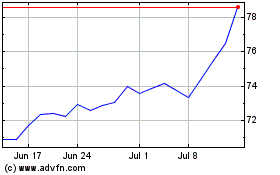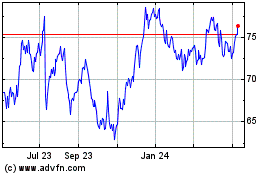SSGA Debunks 5 Retirement Savings Myths about Generation X and Millennials
January 27 2016 - 12:37PM
Business Wire
New research from State Street Global Advisors, the asset
management arm of State Street Corporation (NYSE: STT), challenges
generational assumptions about employees who participate in
workplace Defined Contribution retirement plans and recommends
different actions employers can take to better engage their
employees. The research also highlights surprising similarities
across “Gen Xers” (aged 33-50) and Millennials (aged 22-32) as it
relates to retirement readiness. For example, regardless of age
over 80% of employees understand that creating a successful
retirement depends on making it a priority and starting early.
“Many long held beliefs about how Millennials and Gen Xers want
to engage with their DC plan are off base and call for some
myth-busting,” says Fredrik Axsater, senior managing director and
head of Global Defined Contribution at SSGA. “When employers
combine a deeper understanding of employees’ views about retirement
and focus their engagement efforts around important life stages,
like starting a career or starting a family, savings programs can
be far more successful.”
The research surveyed plan employees aged 22-50, a group SSGA
has named “Generation DC.” This group is the first cohort to rely
predominantly on a defined contribution plan as their primary
source of retirement funding. SSGA believes that by studying
Generation DC, employers can better understand how to improve the
experience and structure of DC plans.
According to the SSGA research, there are five myths to debunk
as a result of their research.
- Myth 1: Millennials would rather
interact with apps than humansReality: Although
Millennials are most likely to say they want apps to help them
prepare for retirement, they also want an annual human interaction
– even more than older employees do. 59% of those aged 22-25 say
they “want an in-person meeting once a year and technology isn’t
really going to help,” compared to 38% for Gen Xers aged
45-50.Action: Employers should recognize that younger
employees may need more guidance than can be solved by an app.
- Myth 2: Millennials don’t care about
planning for retirement—it’s too far awayReality: 88% of
Millennials agree it’s important to start saving for retirement
early similar to the 86% for their more experienced Gen X
counterparts. Additionally both Millennials and Gen Xers agree that
saving for retirement is a priority (83%).Action: Harness
younger employees’ awareness of the importance of retirement
preparation and connect that to a specific action such as
enrollment or saving a little more.
- Myth 3: Most people are “over” the
financial crisisReality: Risk averse beliefs are still
rampant today. Over half of millennials (54%) admitted that their
parents’ experience with the financial crisis that began in 2008
has impacted their confidence as investors. That increases to 60%
for those who are 33-39 years old.Action: If market
volatility rears its ugly head, don’t avoid it. Speak to employees
rationally about volatility and the reality of long-term investing
and importance of “staying the course”.
- Myth 4: Employers hold the reins
when it comes to informing and influencing
employeesReality: Friends and family come first when it
comes to influence. 68% of Generation DC said that friends and
family are the ones who told them to start saving. Additionally,
over 90% indicated that their spouse/partner’s annual salary played
an important role in their financial wellbeing.Action:
Employers can find ways to engage both employees and their family
members with simple, jargon-free messages about retirement planning
that stimulate healthy conversations.
- Myth 5: We need to educate people
more about retirement and investingReality: Experience
is a significant contributor to literacy. SSGA used a standard
battery of questions to test literacy and the results indicate that
as people hit their 40’s their literacy about basic financial and
investing improves. For example, when asked if buying a single
company stock provided a safer return than a stock mutual fund,
only 46% of millennials correctly answered that the stock was more
risky. However, 57% of Gen Xers answered correctly and that
increased to 77% for the 45+ group.Action: Be consistent
with core “rules of thumb” messaging about retirement preparedness
and recognize that the 40 and over population is more prepared to
talk comprehensively about retirement planning. Employers should
engage them more fully on their life journey while they can still
make a difference, instead of waiting until they are 50.
“Our research highlights numerous opportunities where employers
can tailor approaches to meet employees where they are in their
life, not necessarily where we believe their generational
preferences may exist,” continued Axsater. “Employers can reach
employees well ahead of retirement by targeting the 40 plus age
group with clear, actionable steps for a better retirement
including communications on how to save more, diversify investments
and spend down savings in retirement. For younger employees, an
over-emphasis on auto-enrollment may be causing employers to miss
an opportunity to discuss savings goals and strategies. We
recommend rethinking those assumptions.”
This survey was fielded in partnership with Boston Research
Technologies, an independent marketing research firm. Data were
collected in October 2015 using a panel of 1,500 U.S. workers, aged
22-50, who were employed on at least a part-time basis and offered
a DC plan by their employer.
For more information on The Participant, click here.
About State Street Global Advisors
For nearly four decades, State Street Global Advisors has been
committed to helping our clients, and those who rely on them,
achieve financial security. We partner with many of the world’s
largest, most sophisticated investors and financial intermediaries
to help them reach their goals through a rigorous, research-driven
investment process spanning both indexing and active disciplines.
With trillions* in assets, our scale and global reach offer clients
unrivaled access to markets, geographies and asset classes, and
allow us to deliver thoughtful insights and innovative
solutions.
State Street Global Advisors is the investment management arm of
State Street Corporation.
*Assets under management were $2 trillion as of December 31,
2015. Please note that AUM totals are unaudited.
Investing involves risk including the risk of loss of
principal.
The views expressed in this material are the views of SSGA
Defined Contribution through the period ended November 30, 2015 and
are subject to change based on market and other conditions.
The information provided does not constitute investment advice
and it should not be relied on as such.
The whole or any part of this work may not be reproduced, copied
or transmitted or any of its contents disclosed to third parties
without State Street Corporation express written consent.
Web: www.SSGA.com
© 2016 State Street Corporation - All Rights Reserved
CORP-1772
View source
version on businesswire.com: http://www.businesswire.com/news/home/20160127006089/en/
State Street CorporationAndrew Hopkins, +1
617-664-2422Ahopkins2@StateStreet.comorElizabeth Powell, +1
202-468-0908powell@daicommunications.com
State Street (NYSE:STT)
Historical Stock Chart
From Mar 2024 to Apr 2024

State Street (NYSE:STT)
Historical Stock Chart
From Apr 2023 to Apr 2024
